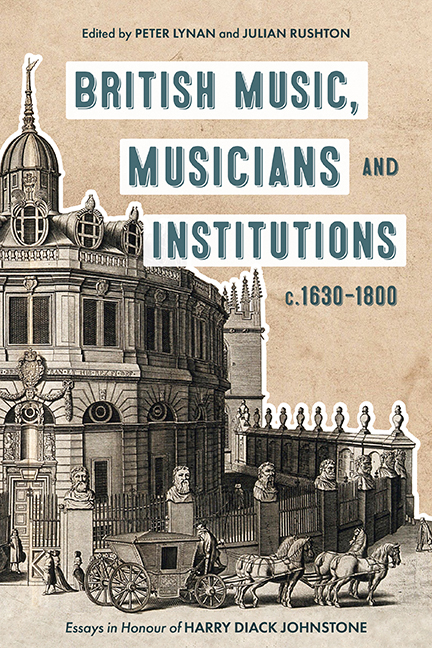Book contents
- Frontmatter
- Contents
- List of Illustrations
- List of Music Examples
- List of Contributors
- Acknowledgements
- List of Abbreviations
- Note to the Reader
- Introduction
- Part I Performers and Performance Style
- Part II Composers and Secular Institutions
- Part III Sacred Music and Institutions
- Part IV Dissemination: Copying, Printing, and Publishing
- Epilogue: Musica Britannica and the Eighteenth Century
- Harry Diack Johnstone: A Tribute
- Bibliography of the Publications of Harry Diack Johnstone
- Index
- Tabula Gratulatoria
5 - Henry Purcell’s Mad Songs in the Theatre and Concert Rooms in the Eighteenth Century
Published online by Cambridge University Press: 06 October 2022
- Frontmatter
- Contents
- List of Illustrations
- List of Music Examples
- List of Contributors
- Acknowledgements
- List of Abbreviations
- Note to the Reader
- Introduction
- Part I Performers and Performance Style
- Part II Composers and Secular Institutions
- Part III Sacred Music and Institutions
- Part IV Dissemination: Copying, Printing, and Publishing
- Epilogue: Musica Britannica and the Eighteenth Century
- Harry Diack Johnstone: A Tribute
- Bibliography of the Publications of Harry Diack Johnstone
- Index
- Tabula Gratulatoria
Summary
In 1781 the young organist and composer R.J.S. Stevens was given a breakfast interview by the Lord Chancellor, Edward Thurlow, whose daughter he was teaching. After questioning him about his background and musical education, Lord Thurlow asked him if he knew Mr Stanley.
I said, ‘that I knew his works, and his abilities as an Organist, but that I had no acquaintance with him’. ‘I once heard him sing Purcell's Mad Bess,’ (said his Lordship) ‘but I suppose that you cannot sing it?’ I said ‘that I believed I could remember it, and if his Lordship would indulge me with a hearing, I would endeavour to exhibit it according to the best of my abilities’. Very fortunately for me, this Cantata of Purcell I had learned by heart when a Chorister: I now sat down to the Instrument, and began Mad Bess: his Lordship attending to me very much. When I had finished, he said, ‘I am obliged to you, Sir; I think I like your expression of this Song as well as I did Mr. Stanley’s’.
Cathedral organists and masters of choristers taught Purcell's female mad songs Mad Bess (‘From silent shades’) and ‘From rosy bowers’ to their most talented boy choristers as excellent vocal exercises that served also as splendid party pieces when they were taken to perform at concerts and music clubs. Stevens had been a chorister at St Paul's under William Savage and became his articled pupil, while Stanley had studied at St Paul's with Maurice Greene. Thomas Norris, a boy chorister at Salisbury Cathedral, sang ‘From rosy bowers’ as Master Norris at the Three Choirs Festival in 1761, and as a tenor performed it in the London oratorio season directed by Stanley in 1779. One ex-Chapel Royal chorister who performed these pieces in the theatre was Handel's leading English tenor, John Beard. On 10 March 1737, when he was twenty-one, he sang Mad Bess at Covent Garden as an entr’acte in Richard Steele's The Funeral, and four days later he performed ‘From rosy bowers’ between the acts of Othello. In April 1748 Beard sang Mad Bess, not as an entr’acte but ‘in Character’ in a madhouse scene in Act 4 of Vanbrugh's adaptation of Fletcher's play The Pilgrim.
- Type
- Chapter
- Information
- British Music, Musicians and Institutions, c. 1630-1800Essays in Honour of Harry Diack Johnstone, pp. 91 - 105Publisher: Boydell & BrewerPrint publication year: 2022

